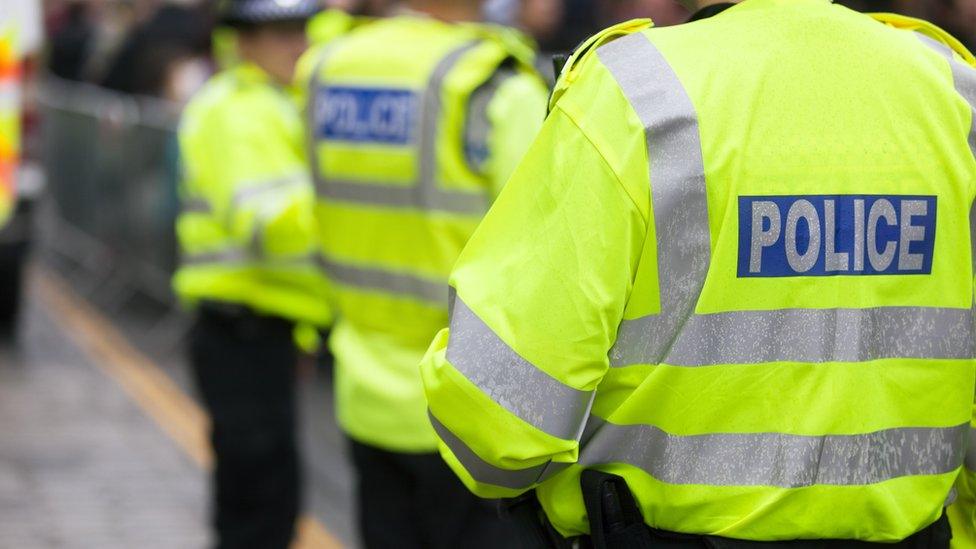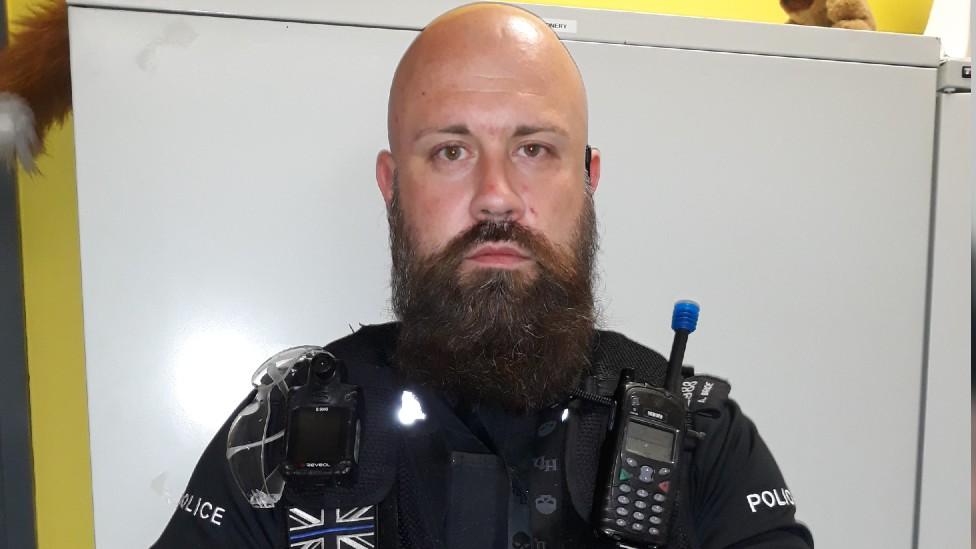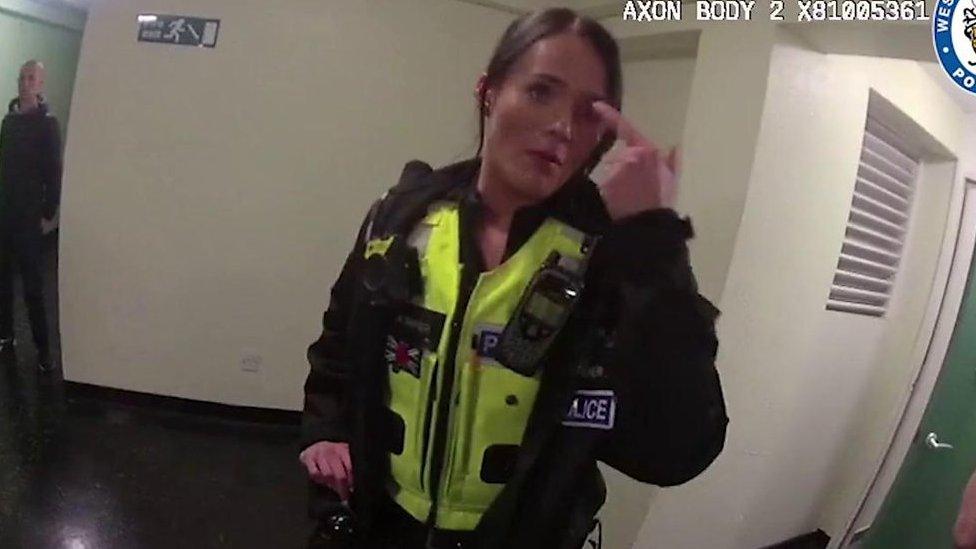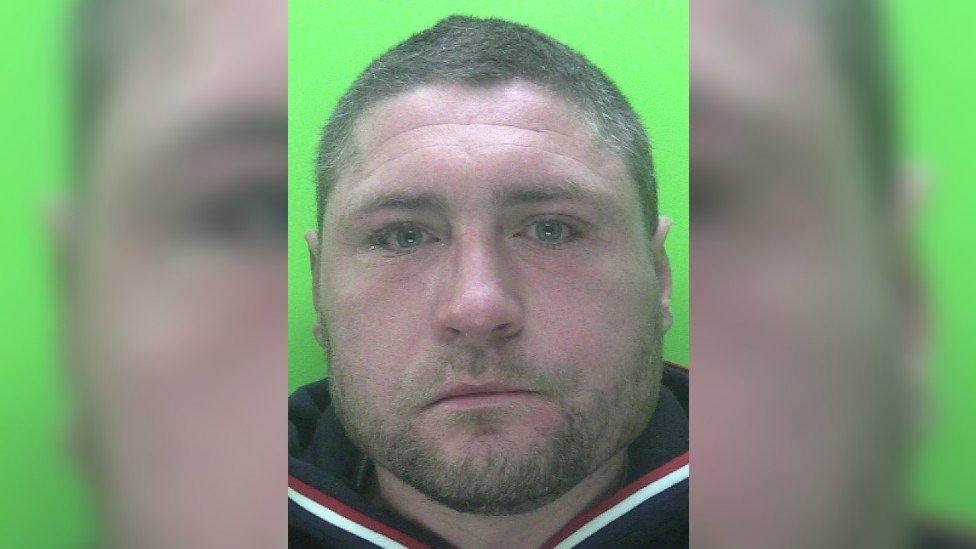Officers 'wary' as spit attacks rise in coronavirus pandemic
- Published

Police chiefs said coughing or spitting at emergency workers was 'deplorable' during the coronavirus pandemic
Spitting attacks on police may be behind a national rise in assaults on emergency workers during lockdown, officials have said.
Figures from the National Police Chiefs Council (NPCC) for England and Wales showed a 14% rise in attacks in one month compared with last year.
An officer said the assaults had made colleagues "really wary" on patrol.
The Crown Prosecution Service (CPS) said it had "moved quickly" to bring these cases to justice.
The figures, for the 43 territorial forces in England and Wales, are a snapshot of assaults on emergency workers in the four weeks to 10 May, compared with the same period last year.
The NPCC said the increase was likely due to a rise in attacks where suspects spat at officers "while claiming to be infected with Covid-19".
More than 300 people were charged with coronavirus-related emergency worker assaults in April, with "the vast majority" resulting with a conviction, the CPS said.
Forces had full access to coronavirus testing facilities, and had low absence figures for officers and staff across the UK, according to the NPCC.

PC Anthony Brice said he was not surprised by the rise in attacks on emergency workers
Nottinghamshire Police officer Anthony Brice was detaining a man in Worksop when he spat at him and his colleague.
Mr Brice later tested negative for Covid-19, but said before the results he and his family were "incredibly anxious".
He said the possibility of these kind of attacks was making officers on patrol during the pandemic "really wary".
"It's always in the back of your mind," he said. "Especially when there's a public order incident when you have to get hands on with the public."
Mr Brice added he was "not surprised" by the national rise in assaults, due to the "frustrations of lockdown" for many.
"We normally get the brunt of everything, people don't like being told what to do," he said.
Daniel Hagerty, 32, of Edinburgh Walk, Worksop, was sentenced to 26 weeks in prison following the assault.
Mr Brice said he was "pleasantly surprised" by the result, having been the victim of assaults in the past, which did not result in prison time.
PC Annie Napier suffered no ill effects after a man spat blood in her eye in Coventry
Several forces across England have published figures for assaults on officers or emergency workers during the coronavirus lockdown.
Thames Valley Police said between March and April there were 198 assaults on police officers, 58 of which involved them being coughed, spat at or bitten
In Kent, police reported 196 assaults on officers in March and April, with nearly double the number of spitting incidents compared to last year
Cleveland Police reported 81 assaults on officers and staff between 30 March and 13 May
Nottinghamshire Police said there had been 61 reported cases of key workers being coughed or spat at between 20 March and 27 April, with a further 28 reported up to 18 May
Officers at Lincolnshire Police were subjected to 36 assaults which included threats to "infect" staff with coronavirus in the four weeks to 24 April, according to the Local Democracy Reporting Service
Over a weekend in March, Avon and Somerset Police reported six officers were "bitten, spat at or someone coughed in their face" saying they had Covid-19
The attacks have been condemned by senior police officers.
Chief Constable of Thames Valley Police John Campbell, said: "To spit, cough or bite an officer or emergency service worker is despicable at any time but in the current situation with coronavirus, it is even more deplorable."
He said any officer who was assaulted was supported by a "comprehensive welfare support plan".
The force said all officers had access to PPE and further protection, such as spit guards.
'Appalling conduct'
Assistant Chief Constable Steve Graham, from Cleveland Police, said the "damaging assaults" had shaken the morale of people working on the frontline.
"Like people living in our communities, our staff are having to deal with the personal impact of Covid-19, and whilst assaults at any time are unacceptable, to have them increase during this uncertain time impacts their wellbeing," he said.
Chief Constable Alan Pughsley, from Kent Police, said: "Fortunately now we're seeing these people go to prison, which is where I think they should be."
Max Hill, director of public prosecutions at the CPS, said: "We've identified particularly appalling conduct towards emergency workers...and we've moved, I think, very quickly, in partnership with the police to bring those cases to justice."

SCHOOLS: When will children be returning?
EXERCISE: What are the guidelines on getting out?
THE R NUMBER: What it means and why it matters
AIR TRAVELLERS: The new quarantine rules
LOOK-UP TOOL: How many cases in your area?

Reporting team: Rob England and the Local Democracy Reporting Service
- Published22 May 2020

- Published12 May 2020

- Published1 May 2020

- Published21 April 2020
